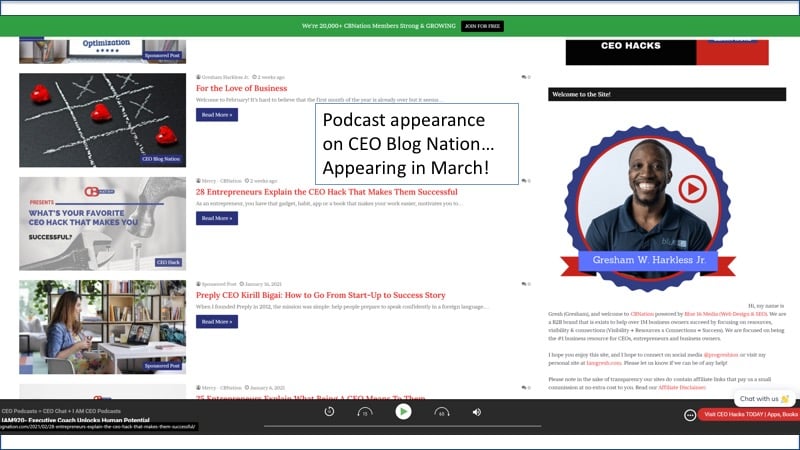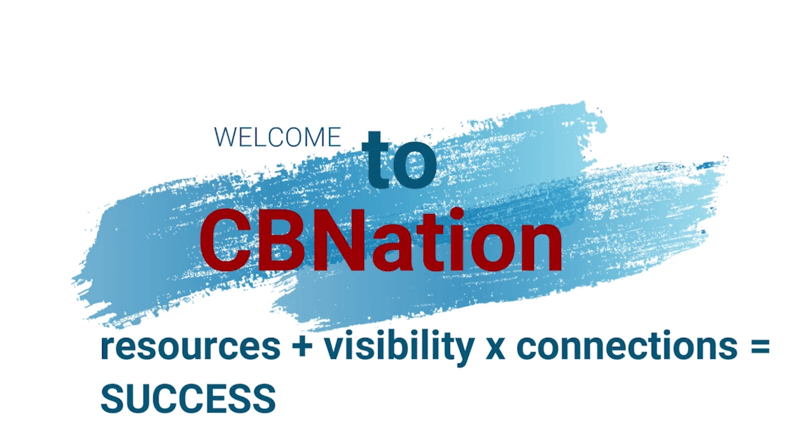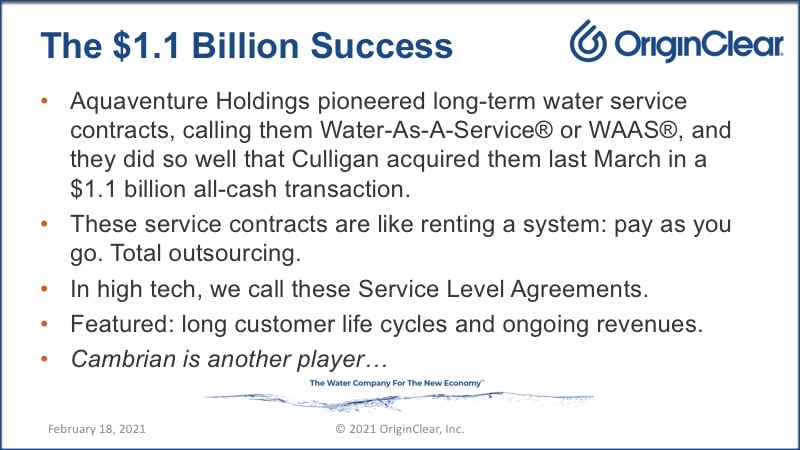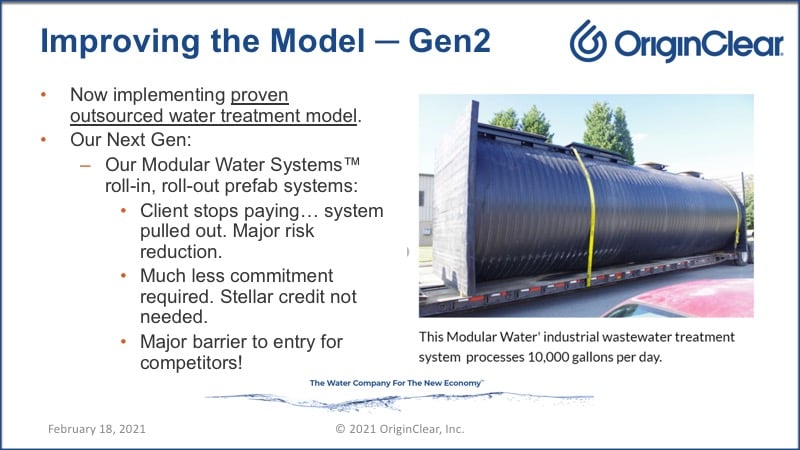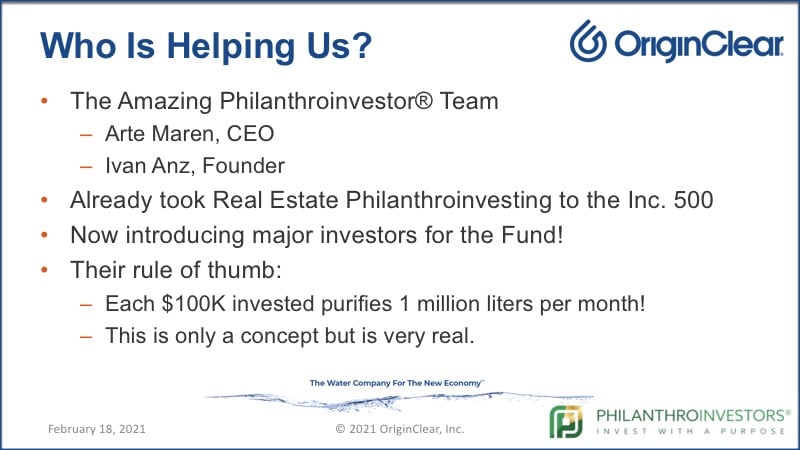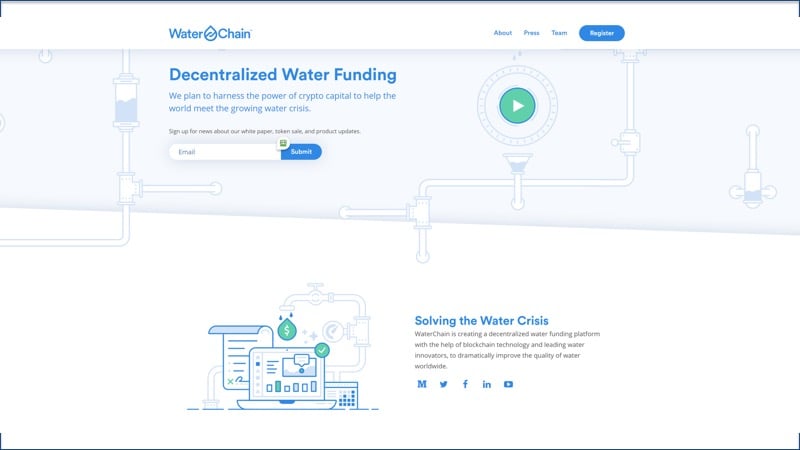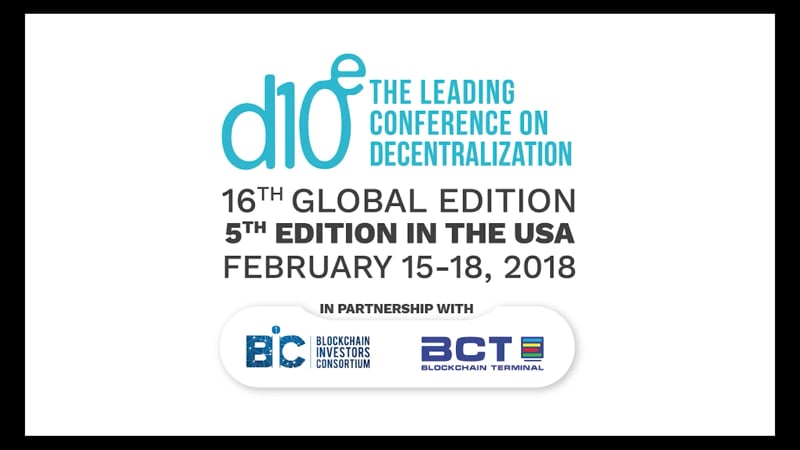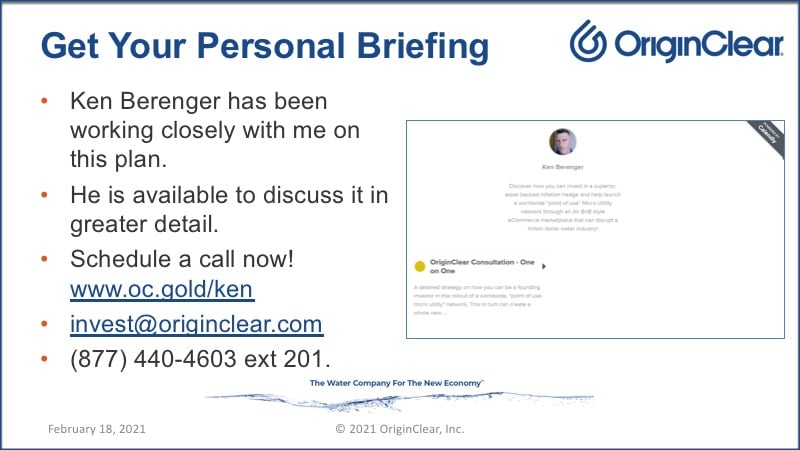Water is the New Gold: Insider Briefing of 18 February, 2021
Helping You Thrive in the World's ONLY Vital, Scarce and
Recession-Proof Market
What about crypto? We revisited the inception of our WaterChain™ and a clip from my d10e Silicon Valley appearance...How is it relevant? And I shared news on major progress funding OriginClear Finance...Find out how it all dovetails with our strategy to roll out prefunded water equipment here in the replay!
FEATURED OR COVERED IN THIS BRIEFING — QUICK LINKS
- A cool clip from Riggs appearance on the CEO Blog Nation show with Gresham Harkless.
- A simple explanation from the CEO of how and why prefunded systems is a total game changer.
- The first ever public discussion of OriginClear's plan for next-gen desal system.
- CEO OriginClear's statement of your best resource for a "secret sauce."
- Our $2 Million definitive agreement with an investor.
- Aquaventure's Water as a Service® and Culligan's acquisition of them for $1.1 Billion.
- How Cambrian Innovation's water purchase agreement model parallels our Water as a Career model and what that means for prefunded water equipment.
- Gen 2 of Modular Water's roll-in, roll-out systems and where they fit into OriginClear Financial and Water as a Career activities.
- How Water as a Career can create a fleet of independent sales people for OriginClear.
- How fast things are moving in building OriginClear Financial.
- The latest on how Philanthroinvestors is helping us.
- The CEO discusses what about crypto? And our WaterChain crypto initiative.
- A replay of Riggs presentation at the 2018 Silicon Valley d10e conference and how it forecast everything OriginClear is doing now!
- Our current focus and how that relates to potentially tokenizing water and WaterChain.
- Water service contracts, how they relate to blockchain smart contracts and how this could affect our future.
- How you can participate in OriginClear's expansion and activities.
Transcript from recording
Introduction
Riggs Eckelbery:
Good evening, everyone. Another amazing briefing as we roll fast through a super-exciting 2021. I'm so happy to have you on board. We're going to start really fast here as we're starting just a few minutes late. Thank you for your patience. I'm just so excited. Before I get too much more excited, let me get started. Okay?
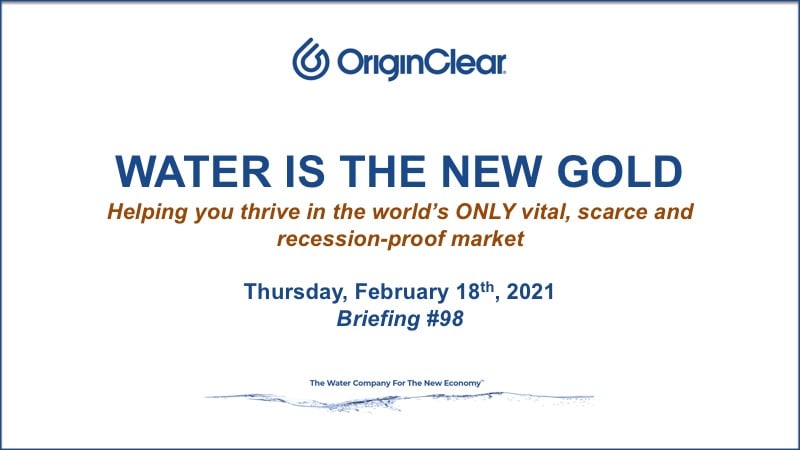
Briefing 98
February 18th, and it is briefing number 98. There's actually many more briefings, but this is the first, we've had almost 100 briefings that were in this cool webinar format. We used to do these cool, literally casual, telephone briefings as I was driving on my way through Los Angeles. Driving through Los Angeles. Yes, that's an old, old game, since I'm in Florida now.
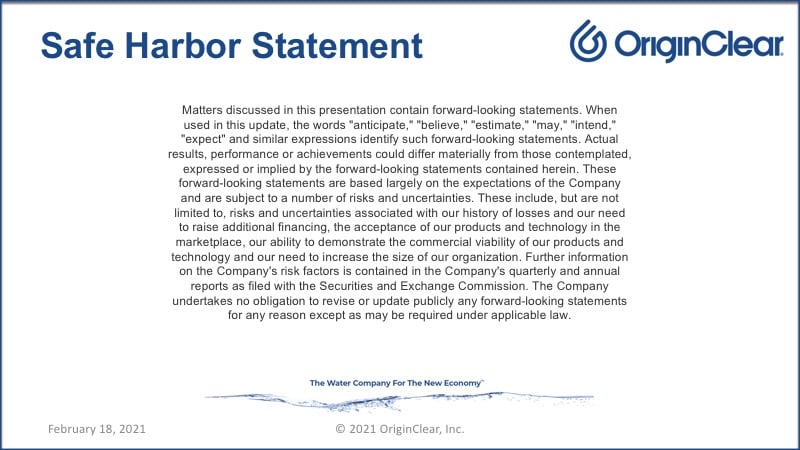
Forward Looking Statements
Okay. Of course, as you know, safe harbor statement means that we're not here to predict the future, except to the extent that we believe it's going to happen. Of course, you must rely on the information in our filings. All right.
Blog Nation
I was on a podcast appearance with Gresham Harkless, the CEO of Blog Nation. I'll give you a very short snippet from this, just for fun. Here we go.
Start of video presentation
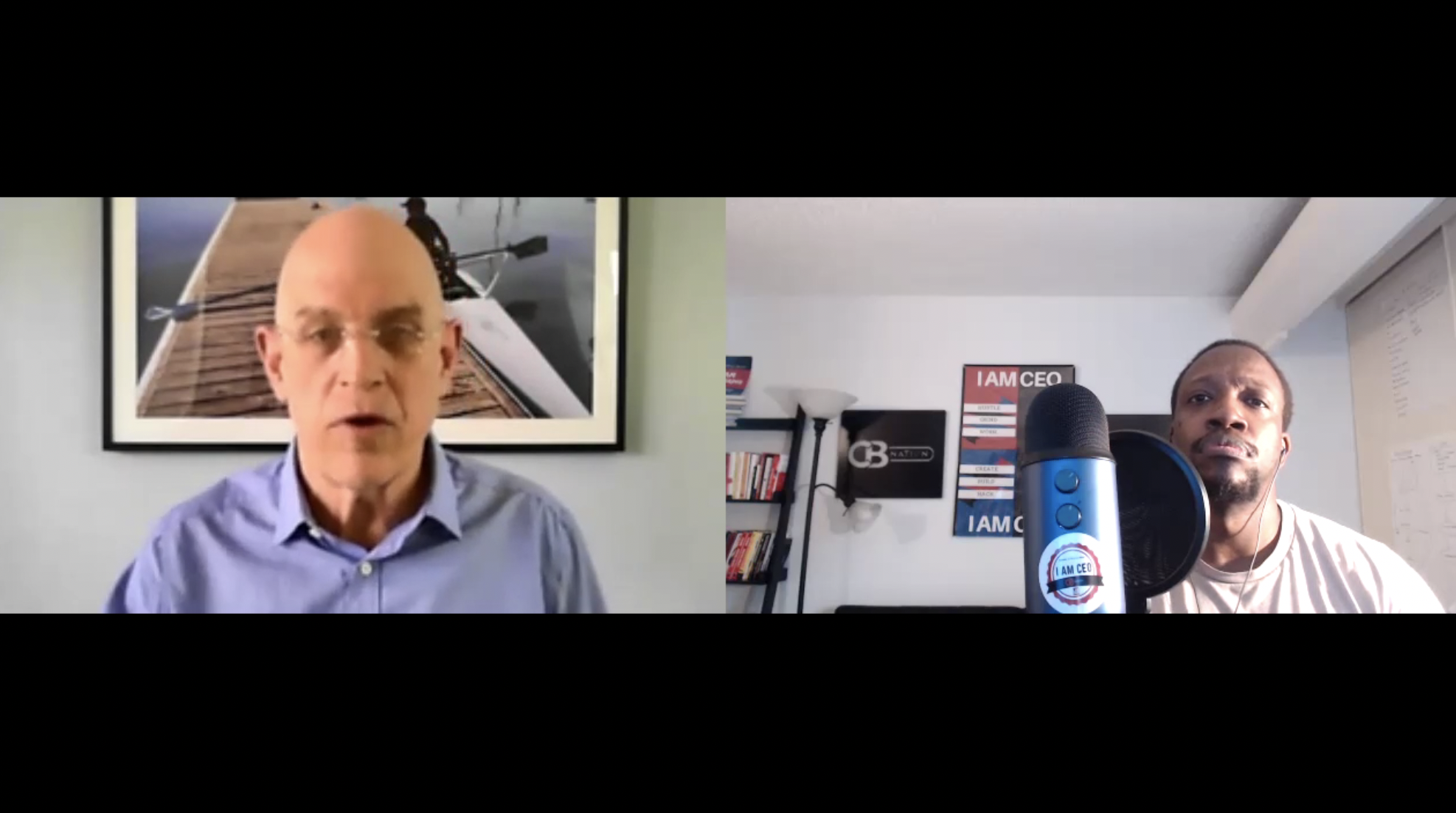
Not Planned
Riggs: If you are a brewery and you have to do your own water treatment now because you got stuck with it, that wasn't on your capital plan! You were not going to spend $2 million on a water treatment system. You were going to spend it on better beer.
Gresham: Sounds like you are partnering with these organizations, these businesses... breweries, for example... that maybe didn't have to solve a problem initially when they started, but now they have to do that, and not sure how exactly how to make that happen.
It's the Funding Stupid
Riggs: We realized that we had to solve the problem of funding self-treatment, localized treatment. We eventually realized, "Wait a minute. It's the funding, stupid." If you can fund these systems and just, "Here, sign here, Mr. Brewery, and you'll just pay on the meter like you always do," and they go, "Okay." Number one. Number two, because we have roll-in roll-out systems, we can always take them back if the guy stops paying. We'll just rent you this system the same way that someone might rent a TV.
Gresham: Awesome. no I definitely appreciate you for sharing that and breaking that down. Because I think so many times, businesses and organizations, sometimes we can get so focused on the thing we're doing rather than the true problem that we're actually solving.
Invent Your Way Out
Riggs: If you're in this intractable situation, invent your way out, find people who are willing to help you figure it out. Utter persistence, but you've got to reinvent. The water industry, it is said, we will run out of water in less than 20 years. By 2040 there will be major, major, major problems in the world with water availability. The gap is where I'm trying to come up with these novel solutions.
Not Logical
Another novel solution that we're working on is desalination, right? Now, desalination is not logical. We should recycle water. We should do better with wastewater treatment. We should do all kinds of things, but 97.5% of the world's water is salt water. 40% of the world's population lives within 100 kilometers of coastlines.
Therefore, we desal, and desalination is super, super energy-intensive, fossil fuel process, very expensive, blah, blah, blah. We're now doing a project, we're about to recruit a university. You're actually the first to hear this. This is the first time I've discussed this publicly.
Gresham: Nice.
Next-Gen Desal
Riggs: We're about to launch a skunkworks project to do something about the next generation of desal, because the technology is already in universities to do this wide availability of cheap, sustainable desalination. We want to use our platform as a public company, to bring this up and roll it out the same way we're doing it with decentralized water treatment.
Gresham: Nice. I definitely appreciate you for sharing that with us. I think so many times, as you said so well, it's not just about having that persistence, but it's also about pivoting and understand that, "Hey, you know, I'm trying to break through the window, but there's a door right over here that everybody's walking through, and that might be a potential opportunity."
Secret Sauce
So I want to ask you for what I call your secret sauce, and this can be for you personally, or the business, or a combination of both.
Riggs: Your own best resource is you, at the end of the day. You have to make sure that you're in a place where you don't feel horrible about what's happening, or let's say somebody is taking advantage of you financially, or whatever's going on. You can't just go, "Oh my God, and it's the end of the world, and I'm to blame and I'm no good." Right?
Oasis of Peace
Sure. We all got to improve ourselves, but at the end of the day, we are our own best resource. You, yourself, remain peaceful. You yourself remain untroubled. Go crazy, deal with the problems, solve them, fix them, do whatever you got to do, but you yourself remain an oasis of peace in a way that people can then go, "Oh, Riggs isn't too worried. I guess it's going to be okay."
Gresham: Yeah. That's extremely powerful, because I think so many times we don't realize the impact that we have by what we're giving off. If you show yourself as worried, then everybody else becomes worried.
Competence Helps
Riggs: Right. Of course, it also helps to be competent. Right?
Gresham: Right!
Riggs: In other words, it helps for the ship not to hit the rocks.
Gresham: Yeah.
Riggs: That's good too.
Gresham: Yeah. So Riggs, truly appreciate you again, my friend, and I hope you have a phenomenal rest of the day.
Riggs: Gresham, thank you for your work, and appreciate the opportunity.
End of video presentation
Riggs: That was a very cool little podcast, a lot of fun. Wow. A lot of people tonight.
Thank you for joining us. Really exciting. In the future, we're also going to add a Facebook Watch. That's one of my plans.
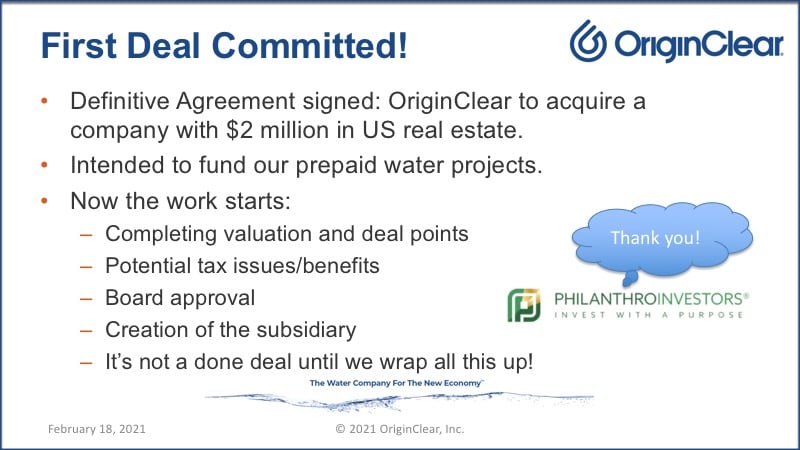
Definitive Agreement Signed
This week, something cool happened in OriginClear Finance. What happened? Well, we signed a definitive agreement to acquire a company that has $2 million in proven US real estate. It's actually in Port St. Lucie, which is a very good market, northern end of the Miami Corridor.
So really exciting, and it's intended to fund what we're calling our prepaid water projects. You can accelerate water projects by, of course, funding them upfront and just having somebody sign on the dotted line, just like I was talking about in this video. What does that mean? Of course, the big work starts.
I want to thank Philanthroinvestors® for having brought us this opportunity. I've got a list of all the things that have to happen, so it's not a done deal by a long shot, but I'm very grateful to the gentlemen and the team as a set of partners that decided to commit to this as opposed to continuing to develop their multi-home development.
Water as a Service
What we're really talking about is What as a Service® already being a winning model. Now, that registered trademark is not ours. It is actually belongs to a company called AquaVenture Holdings, which pioneered these long-term water service contracts, Water-as-a-Service, and they were acquired last March for $1.1 billion, all cash, and went private. AquaVenture Holdings was public. Culligan bought them and took them private, and that is the model we are implementing.
SLAs
Basically, they're like pay-as-you-go. It's an outsourced model. In high-tech, we used to call these service level agreements, meaning that if you have an Internet service provider, they will guarantee 99.99%, whatever uptime, and that's called an SLA or service level agreement.
Well, imagine a similar thing happening to water. Well, that's becoming more and more of a fact of life in the water industry, and it's how we're accelerating our business. Now, what do you get out of it? Long customer life cycles. I've been an EarthLink customer since 1994, really since before the web. This is some exciting stuff. Also, you get a continuous revenue situation.
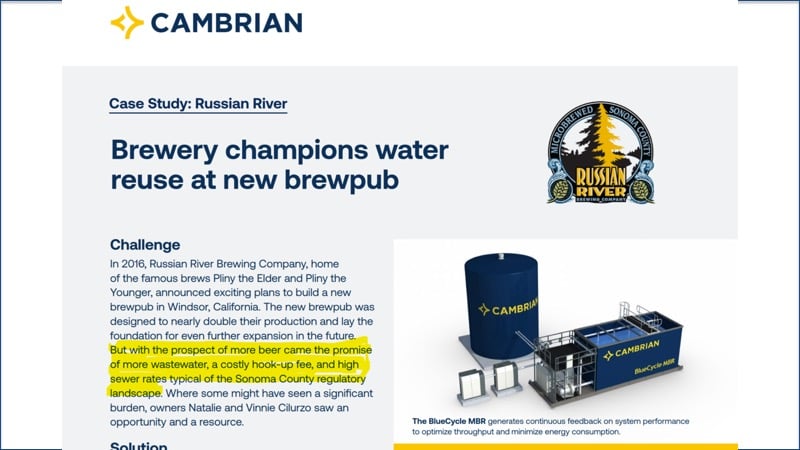
Cambrian Innovation
Another player is Cambrian. Cambrian is a private company, and they raised a ton of money, about $18 million, and most recently in 2019. Here's an example of what we were talking about. I'm not the only person talking to you about companies have to decentralize.
This is a story about the Russian River Brewing Company, which was doubling their production. They had a problem because it was going to cost them so much money. They went ahead and did a deal with Cambrian where they would get this basically a very similar system to ours, except that we have a better package we think that would continuously clean the wastewater, allow it to be reused.
A brewery can reuse about 50% of its wastewater even if it's not using the water for beer, which not everybody's going to love. But nonetheless, it's a big game. Now this is, I think, a 15-year contract that the Russian River owners have made with Cambrian.
Roll-in, Roll-out Prefab Systems
But here's our secret sauce. This is where we take it. This is our Gen2 model. Because we have roll-in, roll-out prefab systems, we have a major risk reduction because the client stops paying, we pull the system.
Secondly, because of that, it's more of a rental model, therefore stellar credit not needed. And that is a major improvement over competitors. This is that amazing technology that we acquired in 2018, which was the five patents that Dan Early brought us and a bunch of software and stuff.
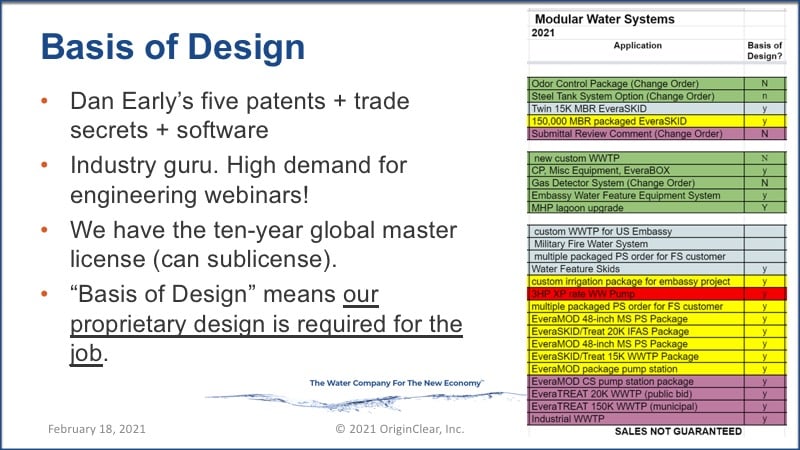
Basis of Design
Here's the key. It's called Basis of Design, meaning you see all these jobs on the right-hand side that our current jobs we're bidding. The great many of them, we are basis of design, which means that they have to use our or Dan Early’s proprietary design, which of course we are the exclusive global licensee for. So that’s very powerful.
Sales Fleet
In addition, last year, as you know, we piloted the whole Water As A Career™ program. We had a meeting last week with Ryan Kooistra, who was our first waterpreneur. He's very happy, and it's going very, very well for him. This lets us kind of send out one man or one woman sales, a fleet of salespeople that can sell pre-funded systems.
For example, I discussed this premium hotel system. It took us a year and a half to close it. But now with pre-funding, a waterpreneur can go out, and sell it, and not have to demand $143,000 upfront. Very important. That's our tweak on it. We'll continue to tweak it.
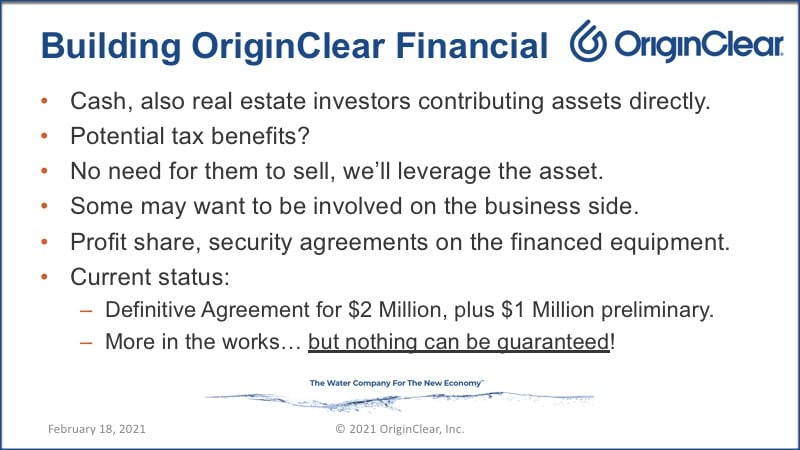
Moving Fast
Building this OriginClear financial means that obviously we'll accept cash, but also what's going on is that real estate investors are diversifying here. The potential tax benefits, we're still working on that, and we may not have to sell the property. We may be able to leverage it; all kinds of details there. And some may want to also get involved in the actual water systems that are put into operation.
And there's various elements, there's a share of the net profits. They have a security right. They have the right to put a lien on the equipment that goes out there. And where we're at, of course, as I told you with, is this definitive agreement for $2 million and a million dollars preliminary commitment and more in the works.
The same gentlemen who did the $2 million package is putting together $1 million package with some other people. So important to remember, this is not a done deal, but it's moving along at the speed of light.
Real Estate Rock Stars
All right, of course, we're grateful to Ivan Anz and Arte Maren, who are the Philanthroinvestor people. I'm told that this is going to be their third year in the Inc. 500. I think that's still a very informal status; shall we say? But they are certainly really rock stars in real estate.
And now, they're introducing investors for this fund, which is key. And they like to use this rule of thumb of for every $100,000 invested, you're getting a million liters per month, which is a good thing. That's why they call it philanthroinvesting. So thank you, gentlemen.
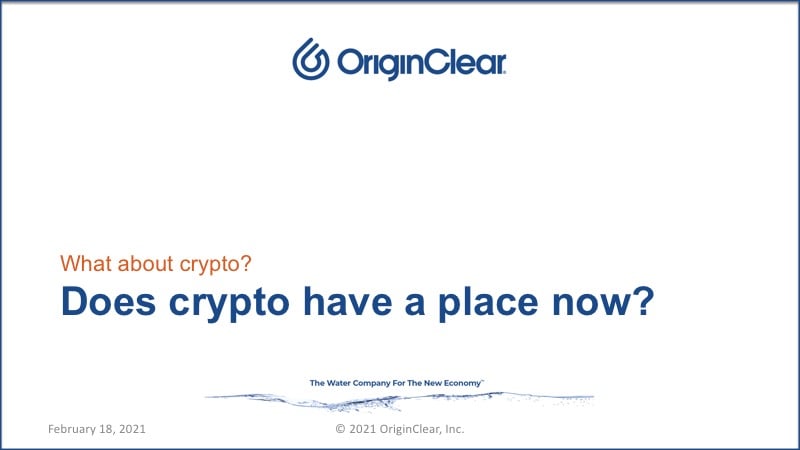
What About Crypto?
Now, maybe you caught my email late this afternoon. It came out of a meeting I was having where I really had to tell the gentlemen, a good friend of mine that I've known for many years, "Dude, we have to stop because I've got to send out the update and get ready." And that is, what about crypto?
Now, does crypto have a place now? We know the crypto is hot, and everybody's going nuts. I think that it is no longer what it used to be. It was a tough, very immature space. I think it has matured, but I wanted to take you a little bit down memory lane.
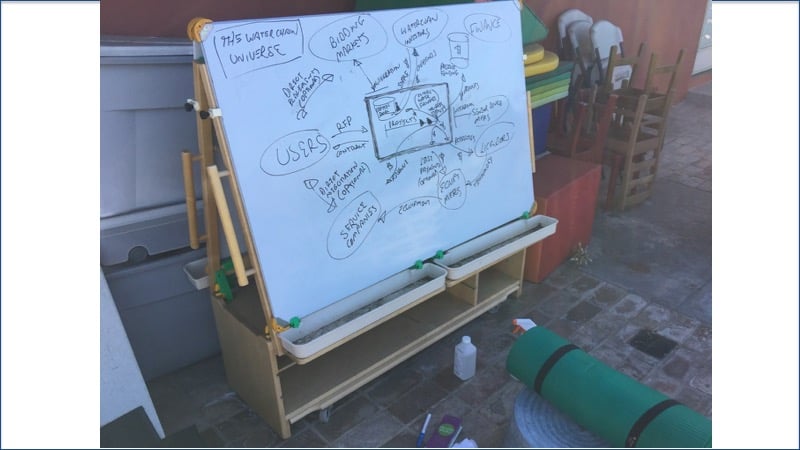
A little over a year ago, I started this process by sketching the WaterChain™ universe in my backyard on my wife's school whiteboard, and this was the beginning of it all right there.
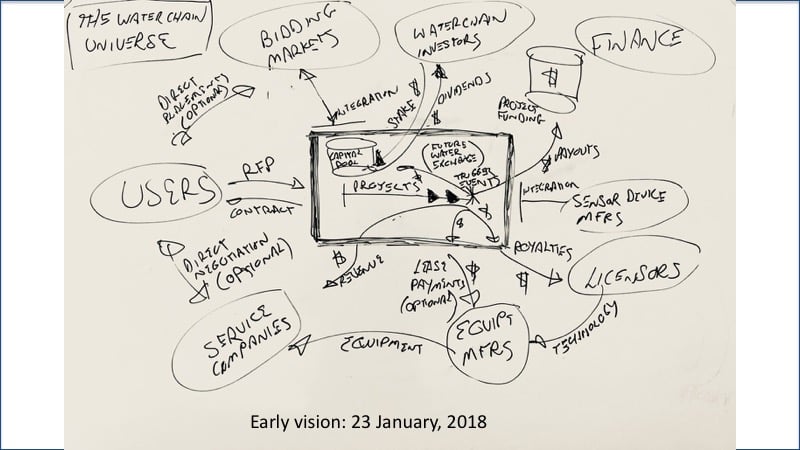
It's About the Contracts
To give you more of that complexity, here, you have all the potential stakeholders. In the middle, you have that capital pool, which of course has OriginClear finance, right? Water exchange. And now, what is important? It's about the contracts. It's about the contracts and that we had a big problem in 2018 which is, how do you track the generation of clean water? Well, if you have the service contracts, you don't have to. Have people go out there and check meters and stuff like that. You already have the thing in place.
Website
So here's the website. It's still up to this day. And it's a little bit out of date, but it still tells the story. But the idea here is to harness the power of crypto capital to meet the growing water crisis. And with that, I'm going to play you a little clip and also try and fix, for some reason, my video went crazy. But I'm going to go back into share mode and you'll be able to see a speech that I made at the time. And I think you'll find it interesting. Here we go.
Start of video presentation
Transcript from recording
![]()
Riggs: The world will run out of water. There'll be 40% more demand for water than there is supply just 12 years from now. Half of the world's citizens will live in water stressed areas. And by the way, if you think you're in the Midwest, you've got a lot of water. Think again, the Ogallala Aquifer is running dry.
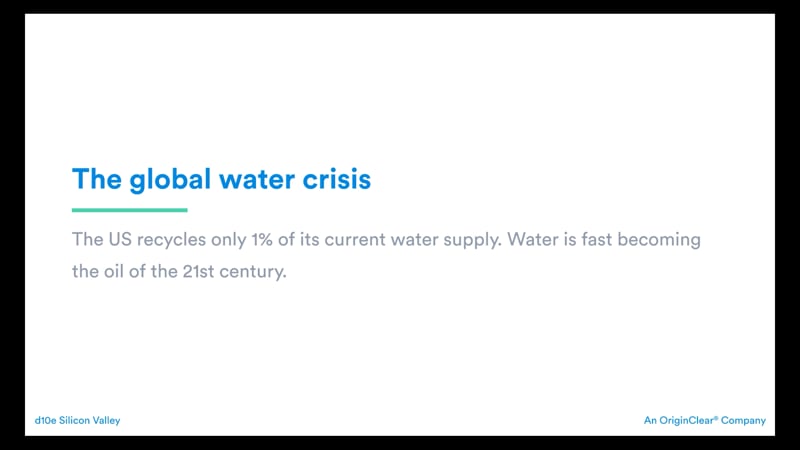
Old School
So we have a problem and we have an industry which is a trillion dollar industry, which needs to accelerate to cope with that crisis. But now it's a trillion dollar industry, but it's also old school.
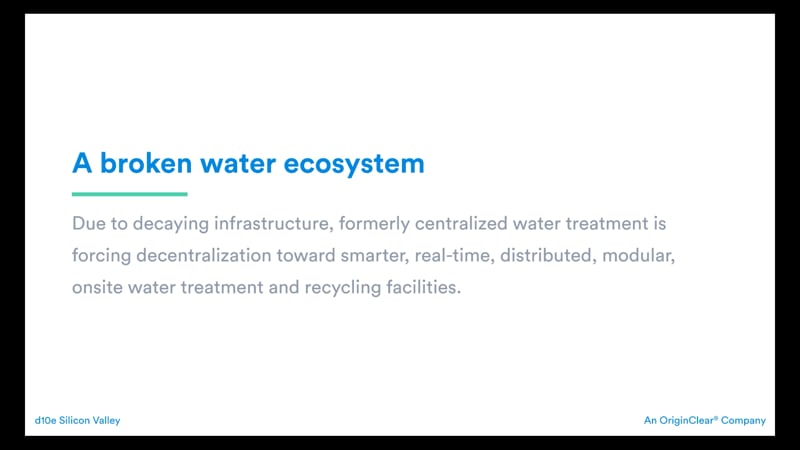
No, You Treat the Water
One of the biggest problems we've got is that the infrastructure is broken. America, for example, is going to take a quarter trillion dollars to fix the water infrastructure, and I don't think that's going to be done anytime soon. So what's happening is that municipalities, the sewage plants are refusing the sewage.
Like, "No, you give us treated water." They're requiring treated water from the factories, the schools, the agricultural farms. Everyone's got to treat their own water. It's called forest decentralization. Ironic, given that we're at a decentralization conference, exactly what's happening in the water industry.
Funding Problem
Now, if you're intel, you don't want to clean the water. You're going to delegate it to someone else. You're also going to delegate the capital problem. You're intel, you can afford a five or $10 million water system, but now you delegate it to a water service company, that's harder for them to do. So that's a real problem for the industry.
But there is a trend towards, and this is the opportunity, there's this trend towards outsourcing, towards modular systems, IoT devices. And that's really the nexus where we find ourselves.
I'm the CEO of a public company that's been 10 years commercializing a technology in the water industry. And I'm told we're getting to the end of the path because it takes 12 to 14 years apparently to commercialize water technology. So I know the problem intimately. We've been a public company for all this time, and now we see this chance to make a change.
How?
I'll talk some more about this. So one of the things we faced when we looked at doing a blockchain initiative was, how do we bring it about? We don't have 12 to 14 years for a blockchain technology to take root. In other words, we can't go to the water industry and go, "Please adopt this. Please do the blockchain with us," and they'll go, "What? It's all good." And I say this with all the love for the water industry because they've got public health requirements to deal with. They have huge liability issues. It's natural that they would be conservative.
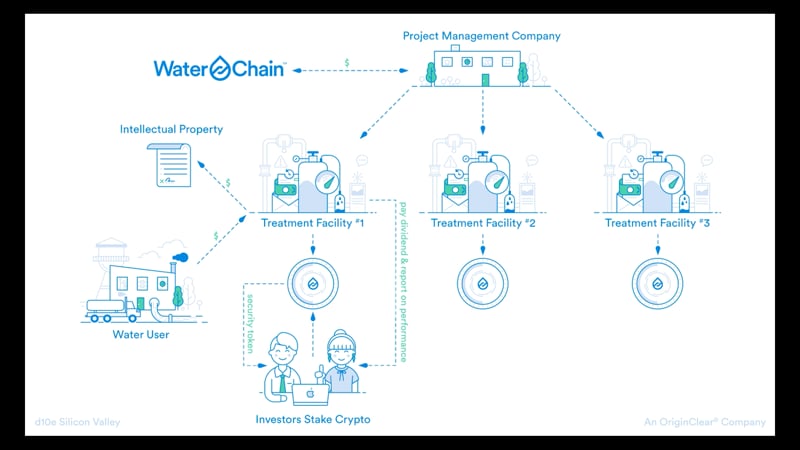
The Power of Crypto
But if we're talking about putting blockchain in, how are we going to do it? And then we suddenly realized that we could simply fund our own ideal systems using the power of crypto funding, and fund these special purpose vehicles that would attack initially just one water treatment project and do it perfectly at the speed of the tech industry.
I came out of the dot com. We know how to move fast. So we make it happen fast. We use the best practices, the best real time devices. We use the blockchain where appropriate and offline technologies, off blockchain technologies buried into it for perfect implementations of real-time, distributed, modular water treatment systems starting with one and expanding from there. Now, very simple.
Participating
How do we do it? Again, coin offerings that people everywhere... if you reply to one of my newsletters, it will come into my inbox. And I get a lot, lot of people saying, "Riggs, I really care about what you do. Please change the world. Can you do better?"
And the hurricanes, oh my God, there was all these people so concerned about the water quality. And my friend Enrique knows all about that from Puerto Rico. And there's such a desire to change the world by fixing the water that people can actually participate directly in water treatment systems that are ideal, rapid, and expanding, hopefully, in a geometrical progression, right?
No Capital Cost
We're going to set up first one treatment facility funded by crypto investors, is going to generate intellectual property learnings that we will roll into the next and the next and the next. And the water users, I mean, let me tell you, you go up to a water user, you go, "Just sign here. Let's negotiate a price per metric ton of water treated, and we're rolling."
They will do it. They will do these deals. So the water user gets the benefit. No capital cost, just operating expense, very efficient. And then we go to number two, number three, et cetera, et cetera. It's simply a growing progression of perfect systems.
Proper Rollout
Now, what drives the water industry more than anything else? What drives you? Money. If the water industry sees capital flowing into water treatment systems, they will put up their hands and participate. As opposed to us saying, "Please use the blockchain." Instead, we create the shining house on the hill and they come to us because the capital is there.
The use cases are fantastic. Their concerns about public health and liability are satisfied. We've run everything proper. Security has regulated the whole thing. So this is a properly done rollout of this new technology.
Every Player is There
So our mission is very simple. We're going to create a decentralized water treatment system using the great technology that's out there. We're not replacing existing players. There's some great device manufacturers who are already cloud enabled. Every single player is out there. People who make these drag and drop water treatment systems and just drop them in the ground and put them to work, these people are out there.
And the people are going to fund it are every single person who cares about water in the world. So this is really not just about the U.S., it's about solving water problems in every country in the world. I'd like you to go to water chain.io, register. This is the very first time we're really laying out this vision publicly, so you're catching us right at the right moment. I'd love to have your input. And I think I have a few moments for questions.
Early Adopters
Onlooker 1: Are you limited to the U.S.?
Riggs: This is a global play. All right? And one of the great ways we can get into other countries, who are the best early adopters? It's the NGOs, it's the nonprofits. Because their problem is they raise a million dollars for some project in Central Africa. Well, they have huge transparency and corruption issues.
So they will like something like this because they can have this, the use of the blockchain is perfect for establishing trust if done properly. So I see, now, OriginClear, the mother company, we're primarily operating in Asia already. We're in China, Malaysia, India, Thailand, as well as in Europe. We're in Spain, North Africa. Before the U.S., we found adoption elsewhere because the U.S. is very conservative. What is the problem with the U.S.? Okay. Who recycles the most water in the world? Anybody know?
Onlooker 2: Israel.
Riggs: Israel, 80% of Israel's water is recycled. What's the number two country in the world?
Onlooker 3: Spain,
Riggs: Spain, 20%, 80-20, where's the US? 1%. So, what does that tell us? It tells us that the early adopters are not in the US. You don't want the most laggard culture to be your early adopters. You want the most... we saw that life cycle graph with the early adopters, that's where it's at. So the early adopters are in South Asia, they're in Africa, they're in Europe, they're North Africa.
Algeria has decreed that they're going to meet European standards or else. They can do it. So I believe it's going to be international first, but for purposes of control, I think our first one would be in the US because we want to do a really good first use case and really establish something fantastic for the future.
Show Host: Thank you so much.
Riggs: Thank you very much.
End of video presentation
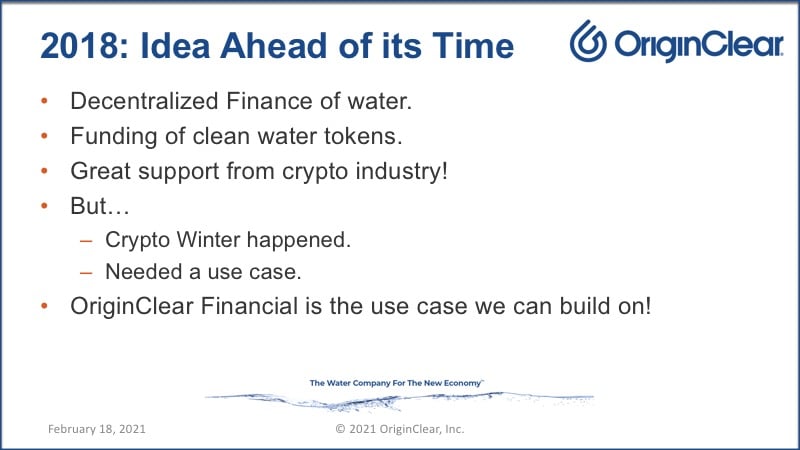
Use Case —Then Tokenize
Well, that was a lot of fun, and very prophetic, in many ways, given what you know happened down the road, it was an idea ahead of its time. So, decentralized finance of water. That's what this is all about, and funding of clean water tokens. Of course, we had great support from the crypto industry. Some of the best people in the industry joined our group, WaterChain, but of course, things hit the wall in mid 2018. It was called crypto winter.
And we needed that use case that I just mentioned in that speech. Well, now we've got the use case funded and we're doing it conventionally. See, it was hard to do pre-funded water systems and also the tokens. It was just too meshed together. We were able to pull it apart and go, let's do the pre-funded water systems, which is OriginClear financial, get the use case, and then we can look at tokenizing it, right?
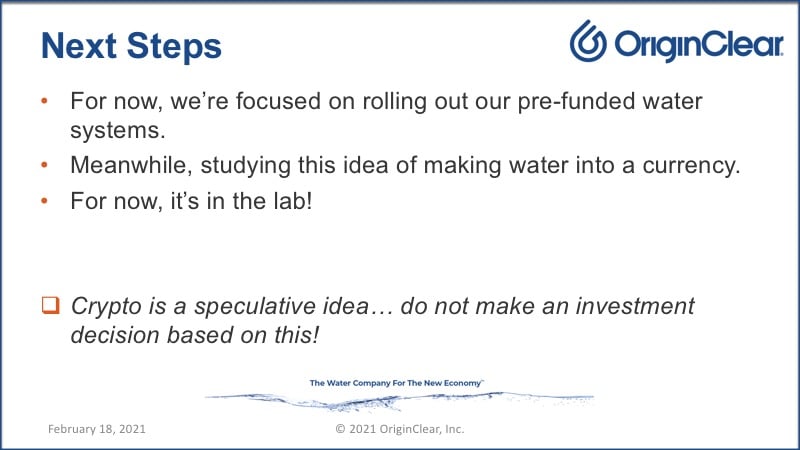
Focus
So next steps we're staying focused on rolling out the pre-funded water systems. That's what we are staying focused on. I'm not going to jump around and do other things for now, but we are studying this idea. It's in the lab.
Please do not wager on how wonderful OriginClear is going to be with a token, I can just see it now, but it makes a lot of sense because, the big problem with tokenizing water is, where's the water? You got to send people out to do audits and so forth.
Service Contracts and Smart Contracts
But instead, if you have all these water as a service contracts, the contracts are on the meter, and now you have Ethereum is a perfect coin for this because it has smart contracts. So you just simply use something like Ethereum as a backbone for this coin. I'm just spit balling here because this is not a technical discussion.
Now you're able to trigger, there's X amount of gallons being treated at this particular location. That turns into tokens that have value. Then you can bring in a desalination plant, you can bring in air harvesting plants, you can do all kinds of players, even Virgin water generation can be put on this. This is a really interesting thing. As long as there is a contract generating the water, then it can be tokenized and then people can invest and the capital pool becomes huge.
So, very exciting as I say, we're staying focused, but we also think that this is a wonderful piece of the roadmap once again, and I couldn't be happier that all this 2018 activity is coming to fruition.
Call Ken
You can help, and Ken Berenger is the man he's been working with me doing amazing things to strategize this, and really is fun. I was just texting him during the video about how it kind of all comes around. It's kind of like bell bottom jeans are now coming back around in a way.
Now this crypto thing, which we were leading with now, of course, it's fully mature and everybody thinks it's great. Back then believe me, it was wild and wooly. With that, to talk to Ken, just type oc.gold/ken in your browser, and you'll be talking to him, he's got a very busy day, but I think you'll find it very interesting.
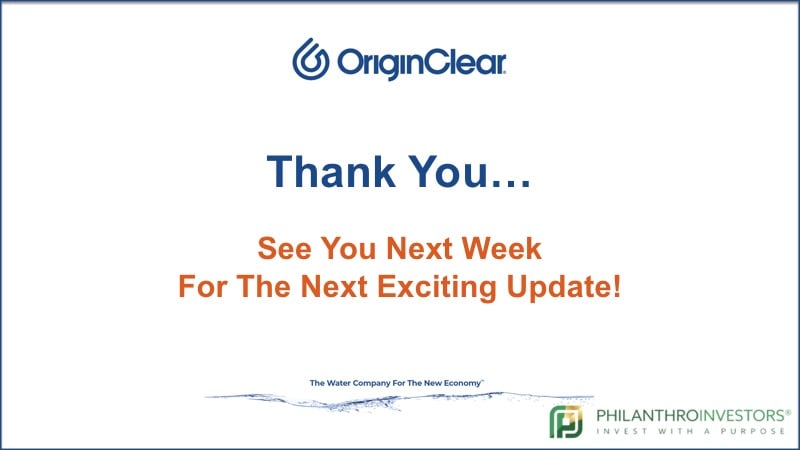
In Closing
I'm not going to tell you the next exciting update because literally, the topics show up at the last minute, but it's been really fascinating spending a little time with you on this and talking about it. I appreciate your time spent tonight. Thank you all for joining us.
Tom Marchesello is a sitting in the gallery here and he was part of the WaterChain effort and wow. It was wild and crazy. I'm sure that he and I will have a chance to discuss it on this show in the future, but it is all coming together, all becoming integrated and I couldn't be happier. With that, I want to thank you all very much for being with me this evening. We've had record number of attendees. Thank you. We really appreciate it, and good night.
Register for next week’s Insider Briefing: HERE
%20250px.png?width=250&height=53&name=OriginClear%20Logo%202019%20(RGB)%20250px.png)


